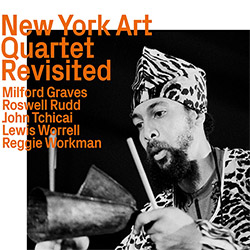
Evolving after a gig in 1963, saxophonist John Tchicai and trombonist Roswell Rudd developed the NYAQ from loft sessions, adding the creative drumming of Milford Graves and bassist Lewis Worrell; ESP was so impressed that they recorded their 1st 1965 album with an Amira Baraka recitation on one track; Reggie Workman then took over the bass chair for their subsequent Mohawk album on the Fontana label.
In Stock
Quantity in Basket: None
Log In to use our Wish List
Shipping Weight: 3.00 units
EU & UK Customers:
Discogs.com can handle your VAT payments
So please order through Discogs
Sample The Album:
Roswell Rudd-trombone
John Tchicai-alto saxophone
Lewis Worrell-double bass
Milford Graves-percussion
Amiri Baraka-(aka Leroi Jones)recitation
Reggie Workman-double bass
Click an artist name above to see in-stock items for that artist.
UPC: 752156114925
Label: ezz-thetics by Hat Hut Records Ltd
Catalog ID: ezz-thetics 1149
Squidco Product Code: 33212
Format: CD
Condition: New
Released: 2023
Country: Switzerland
Packaging: Cardboard Gatefold
Recorded in New York City, on November 26th, 1964, and July 17th, 1965.
New York Art Quartet / LeRoi Jones was originally released in 1965 as a vinyl LP on the ESP Disk label with catalog code 1004, and distributed on the Fontana label with catalog code STL 5521.
Mohawk was originally released in 1965 as a vinyl LP on the Fontana label with catalog code 681 009.
"John Tchicai had a gig at a midtown restaurant in late 1963 that lasted one night. Fortuitously, Roswell Rudd was there on the recommendation of Don Cherry, and was knocked out by the saxophonist's sound and phrasing. Tchicai and Rudd then woodshedded around their day-job schedules for several months, their "good telepathy" - Rudd's 2010 characterization - indicating the formation of a quartet, for which they tapped Don Moore and J.C. Moses of New York Contemporary Five. However, Milford Graves sat in at the end of the group's first rehearsal, probably at Michael Snow's loft; not only did Moses lose the gig that night, but Graves' radical approach also caused Don Moore to quit. Tchicai then enlisted Lewis Worrell, one of the first musicians he met after arriving in New York.
Naming the group New York Art Quartet was Tchicai's idea. Rudd initially thought it "was too uppity, not funky enough for a jazz band." However, the name reflected the times, with the New Thing repositioning itself in a wider context of avant-garde arts through initiatives like the Jazz Composers Guild (of which Rudd and Tchicai were members) and concert series like the October Revolution in Jazz and Four Days in December (NYAQ performed in the former after only a few gigs, and shared a New Year's Eve bill at Judson Hall with Sun Ra's Arkestra to culminate the latter).
Impressed by Rudd and Tchicai's contributions to the July 1964 session that produced the soundtrack for Snow's film New York Eye and Ear Control, ESP-Disk's Bernard Stollman recorded NYAQ in November, but the release of the album was delayed due to the Jazz Composer Guild's short-lived boycott of record companies. By then, Worrell had moved on, replaced primarily by Reggie Workman. In July 1965, NYAQ had its most high-profile concert, opening for the Jazz Composers Orchestra as part of the Museum of Modern Art's well-publicized Jazz in the Garden series; they also recorded Mohawk for the Fontana series midwifed by Tchicai.
By then, the striving Tchicai had booked a fall European tour, but only Rudd joined him, prompting the enlistment of Louis Moholo and Finn van Eyben. The ongoing rapport between Rudd and Tchicai is evidenced by the Hilversum radio session released as a Rudd date by America in 1971, and other material recorded in Copenhagen compiled for an archival release on Cuneiform in 2010. The two horn players reunited with Graves upon their return in late November, with either Walter Booker or Richard Davis rounding out the foursome; but in January, Rudd went on a lengthy West Coast tour with Archie Shepp, effectively dissolving NYAQ.
NYAQ were barely acknowledged in the press during its short life. They curiously received only passing mention as "the John Tchicai-Roswell Rudd group" in a LeRoi Jones Apple Cores column in Down Beat, published months after the poet-critic had read "Black Dada Nihilismus" for the ESP album. The group's name appears only in the header of Ralph Berton's notorious Down Beat review of the JCG Jazz in the Garden concert, an over-the-top spewing of cheap shots. Additionally, their recordings were passed over by critics in favor of John Coltrane's Impulse albums, Cecil Taylor's Blue Notes, and others - very few copies of Mohawk were even available in the US.
Despite their scant recognition in the mid-1960s, New York Art Quartet nevertheless became legendary over the decades, prompting a 35th anniversary reunion in 1999 and European festival performances in the early 2000s. As the 60th anniversary of their formation approaches, revisiting their studio recordings gives insights into how their contrasting sensibilities created a unique chemistry, and how the resulting music undermines stereotypes about the jazz avant-garde in the 1960s.
On paper, Graves, Rudd, and Tchicai were an unlikely trinity. Graves had primarily played Latin jazz on timbales, and his then-recent transition to kit drumming privileged African and Caribbean elements over modern jazz practice. Like Steve Lacy, Rudd initially played traditional jazz, stretching that vocabulary working with Shepp, Cecil Taylor, and others. By the time Tchicai arrived in New York, the early influence of Lee Konitz had been submerged in skeletal lines and a keening tone.
Yet, with both Worrell and Workman, NYAQ contoured a distinctive ensemble sound, one more insinuating than confrontative, and more reliant on nuanced compositional materials like Tchicai's "Quintus T" and Rudd's "Short" and "Sweet V" (listed as "Sweet" on the ESP album). Certainly, NYAQ could muster a powerfully churning energy on vehicles like Tchicai's "No. 6," as well as rabble-rousing rambunctiousness on Rudd's "Banging on The White House Door;" but their incisive deconstruction of Charlie Parker's "Mohawk" and Tchicai's caressing of "Everything Happens to Me" reflect a less militant, reactionary stance towards the tradition, one that was not universally shared by their contemporaries. It was an inclusive aesthetic that was far more prevalent by the mid-1970s than during the revolutionary mid-1960s.
"If we just could have hung on for another year," Rudd said of both NYAQ and the Jazz Composers Guild, "things could have turned out much differently. Things were about to flip, in a good way. A lot of government programs were starting up that we could have gotten grants from. There was a change in perception about the music that was happening. People were starting to consider it as art. The music was moving out of the bars and coffee houses and into museums and concert halls. But, the Guild lasted long enough to inspire musicians to organize. The Guild laid the groundwork for similar organizations here in America and in Europe - what happened in Holland is a good example. We were just a little ahead of the times." "-Bill Shoemaker, January 2023

The Squid's Ear!
Artist Biographies
• Show Bio for Roswell Rudd "Roswell Hopkins Rudd, Jr. (born November 17, 1935) is an American jazz trombonist and composer. Although skilled in a variety of genres of jazz (including Dixieland, which he performed while in college) and other genres of music, he is known primarily for his work in free and avant-garde jazz. Since 1962 Rudd has worked extensively with saxophonist Archie Shepp. Rudd was born in Sharon, Connecticut. He attended the Hotchkiss School and graduated from Yale University, where he played with Eli's Chosen Six, a dixieland band of students that Rudd joined in the mid-'50s. The sextet played the boisterous trad jazz style of the day and recorded two albums, including one for Columbia Records. His collaborations with Cecil Taylor, Archie Shepp, John Tchicai, and Steve Lacy grew out of the lessons learned while playing rags and stomps for drunken college kids in Connecticut. Rudd later taught ethnomusicology at Bard College and the University of Maine. On and off for a period of three decades, he assisted Alan Lomax with his world music song style (Cantometrics) and Global Jukebox projects. In the 1960s, Rudd participated in free jazz recordings such as the New York Art Quartet; the soundtrack for the 1964 movie New York Eye and Ear Control; the album Communications by the Jazz Composer's Orchestra; and in collaborations with Don Cherry, Larry Coryell, Pharoah Sanders, and Gato Barbieri. Rudd has had lifelong friendships with saxophonists Archie Shepp and Steve Lacy and has performed and recorded the music of Thelonious Monk with Lacy. Rudd and his producer and partner Verna Gillis went to Mali in 2000 and 2001. His album MALIcool (2001), a cross-cultural collaboration with kora player Toumani Diabatˇ and other Malian musicians, represented the first time the trombone had been featured in a recording of Malian traditional music. In 2004, he brought his Trombone Shout Band to perform at the 4th Festival au Dˇsert in Essakane, Tombouctou Region, Mali. In 2005, he extended his reach further, recording an album with the Mongolian Buryat Band, a traditional music group of musicians from Mongolia and Buryatia, entitled Blue Mongol. Rudd conducts master classes and workshops both in the United States and around the world." ^ Hide Bio for Roswell Rudd • Show Bio for John Tchicai "John Martin Tchicai (April 28, 1936 - October 8, 2012) was a Danish free jazz saxophonist and composer. After moving to New York City in 1963, Tchicai joined Archie Shepp's New York Contemporary Five and the New York Art Quartet. He played on John Coltrane's Ascension, and Albert Ayler's New York Eye and Ear Control, both influential free jazz recordings. Tchicai was born in Copenhagen, Denmark, to a Danish mother and a Congolese father. The family moved to Aarhus, where he studied violin in his youth, and in his mid-teens began playing clarinet and alto saxophone, focusing on the latter. By the late 1950s he was travelling around northern Europe, playing with many musicians. Following his work in New York, Tchicai returned to Denmark in 1966, and shortly thereafter focused most of his time on music education. He formed the small orchestra Cadentia Nova Danica with Danish and other European musicians; this group collaborated with Musica Elettronica Viva and performed in multi-media events. Tchicai was a founding member of Amsterdam's Instant Composers Pool in 1968, and in 1969 took part in the recording of John Lennon and Yoko Ono's Unfinished Music No.2: Life with the Lions. On August 30, 1975, Tchicai's appearance at the Willisau Jazz Festival was recorded and released later that year as Willi The Pig. On this record, he plays with Swiss pianist Irène Schweizer. Tchicai returned to a regular gigging and recording schedule in the late 1970s. In the early 1980s he switched to the tenor saxophone as his primary instrument. In 1990 he was awarded a lifetime grant from the Danish Ministry of Culture. Tchicai and his wife relocated to Davis, California, in 1991, where he led several ensembles. He was awarded a National Endowment for the Arts fellowship in 1997. He was a member of Henry Kaiser and Wadada Leo Smith's "Yo Miles" band, a loose aggregation of musicians exploring Miles Davis's electric period. Since 2001 he had been living near Perpignan in southern France. On June 11, 2012, he suffered a brain hemorrhage in an airport in Barcelona, Spain. He was recovering and had canceled all appearances when he died in a Perpignan hospital on October 8, 2012, aged 76." ^ Hide Bio for John Tchicai • Show Bio for Lewis Worrell "Bassist Lewis Worrell served as a hired gun for several renowned jazz artists of the '60s, chiefly Albert Ayler. Born Lewis James Worrell in Charlotte, NC, on November 7, 1934, Worrell first took up the tuba (playing it for six years) before switching over to the bass. Worrell didn't start recording with others however until the early '60s, when he played on the self-titled debut by the New York Art Quartet in November of 1964. From there, Worrell could be heard on releases by Ayler (1965's Bells and 1966's Quintet Live at Slug's Saloon, Vols. 1 & 2), as well as Sunny Murray's Sunny's Time Now, Archie Shepp's Live in San Francisco and Three For a Quarter, One For a Dime, and Roswell Rudd's Everywhere. Despite a promising session career laying ahead of him, Worrell would only contribute to one more recording, 1967's Until, before almost completely disappearing from the music scene all together (he managed to reappear on the Sam Rivers Trio's 1973 release, Live). 1998 saw the release of an archival Albert Ayler live set (featuring several concerts from the mid-'60s), which featured Worrell on bass."-Greg Prato ^ Hide Bio for Lewis Worrell • Show Bio for Milford Graves "Milford Graves (born August 20, 1941 in Queens, New York) is an American jazz drummer and percussionist, most noteworthy for his early avant-garde contributions in the early 1960s with Paul Bley and the New York Art Quartet alongside John Tchicai, Roswell Rudd, and Reggie Workman. He is considered to be a free jazz pioneer, liberating the percussion from its timekeeping role. In fact, many of his music contemporaries, musician inspirees, and fans worldwide would argue that Graves is perhaps the most influential known musician in the development and continuing evolution of free-jazz/avant-garde music, to date. Milford Graves taught at Bennington College, in Bennington, Vermont, as a full-time professor from 1973 until 2011, when he was awarded Emeritus status. Initially playing timbales as a kid growing up in Queens, Graves has worked as a sideman and session musician with a variety of jazz musicians throughout his career, including Pharoah Sanders, Rashied Ali, Albert Ayler, Don Pullen, Kenny Clarke, Don Moye, Andrew Cyrille, Philly Joe Jones, Eddie Gómez, and John Zorn. He has invested his time in research within the field of healing through music. In 2013, Milford Graves along with Drs.Carlo Tremolada and Carlo Ventura received a patent for an invention that relates to a process of preparing a non-expanded tissue derivative, that is not subjected to cell proliferation in vitro, which has a vascular-stromal fraction enriched in stem and multipotent elements, such as pericytes and/or mesenchymal stem cells, or for preparing non-embryonic stem cells obtained from a tissue sample or from such tissue derivative, wherein the tissue derivative or such cells are subjected to vibrations derived from a heart sound to control the degree of differentiation or possible differentiation of the stem and multipotent elements into several other types of cells and optimize their potency. The invention relates also to a device for carrying out the process, to stem cells obtainable by the process as well as a drug for the regeneration of an animal tissue." ^ Hide Bio for Milford Graves • Show Bio for Amiri Baraka "Amiri Baraka (born Everett Leroy Jones; October 7, 1934 - January 9, 2014), previously known as LeRoi Jones and Imamu Amear Baraka, was an American writer of poetry, drama, fiction, essays and music criticism. He was the author of numerous books of poetry and taught at several universities, including the University at Buffalo and Stony Brook University. He received the PEN/Beyond Margins Award in 2008 for Tales of the Out and the Gone. Baraka's plays, poetry, and essays have been described by scholars as constituting defining texts for African-American culture. Baraka's career spanned nearly 52 years, and his themes range from black liberation to white racism. His notable poems include "The Music: Reflection on Jazz and Blues", "The Book of Monk", and "New Music, New Poetry", works that draw on topics from the worlds of society, music, and literature. Baraka's poetry and writing have attracted both high praise and condemnation. In the African-American community, some compare Baraka to James Baldwin and recognize him as one of the most respected and most widely published black writers of his generation, though some have said his work is an expression of violence, misogyny, and homophobia. Baraka's brief tenure as Poet Laureate of New Jersey (in 2002 and 2003) involved controversy over a public reading of his poem "Somebody Blew Up America?", which resulted in accusations of antisemitism and negative attention from critics and politicians." ^ Hide Bio for Amiri Baraka • Show Bio for Reggie Workman "Reginald "Reggie" Workman (born June 26, 1937 in Philadelphia, Pennsylvania) is an American avant-garde jazz and hard bop double bassist, recognized for his work with both John Coltrane and Art Blakey. Workman was a member of jazz groups led by Gigi Gryce, Roy Haynes, Wayne Shorter and Red Garland. In 1961, Workman joined the John Coltrane Quartet, replacing Steve Davis. He was present for the saxophonist's Live at the Village Vanguard sessions, and also recorded with a second bassist (Art Davis) on the 1961 album, Olˇ Coltrane. After a European tour, Workman left Coltrane's group at the end of the year. Workman also played with James Moody, Art Blakey's Jazz Messengers, Yusef Lateef, Pharoah Sanders, Herbie Mann and Thelonious Monk. He has recorded with Archie Shepp, Lee Morgan and David Murray. He is currently a professor at The New School for Jazz and Contemporary Music in New York City, and is a member of the group, Trio 3, with Oliver Lake and Andrew Cyrille." ^ Hide Bio for Reggie Workman
7/9/2025
Have a better biography or biography source? Please Contact Us so that we can update this biography.
7/9/2025
Have a better biography or biography source? Please Contact Us so that we can update this biography.
7/9/2025
Have a better biography or biography source? Please Contact Us so that we can update this biography.
7/9/2025
Have a better biography or biography source? Please Contact Us so that we can update this biography.
7/9/2025
Have a better biography or biography source? Please Contact Us so that we can update this biography.
7/9/2025
Have a better biography or biography source? Please Contact Us so that we can update this biography.
Track Listing:
1. Short 8:23
2. Sweet / Black Dada Nihilismus 12:00
3. Rosmosis 14:48
4. No. 6 (1964) 8:08
5. Rufus 3rd 6:40
6. Mohawk 4:45
7. Banging On The White House 9:12
8. No. 6 (1965) 6:17
9. Everything Happens To Me 6:38
Hat Art
Improvised Music
Jazz
Free Improvisation
NY Downtown & Metropolitan Jazz/Improv
Quartet Recordings
Jazz Reissues
Staff Picks & Recommended Items
New in Improvised Music
Top Sellers for 2023 by Customer Sales
Search for other titles on the label:
ezz-thetics by Hat Hut Records Ltd.

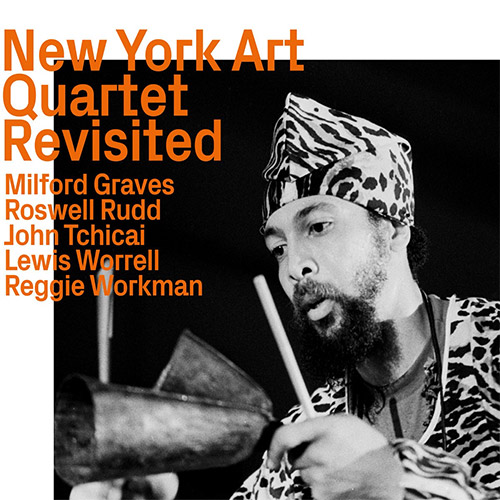




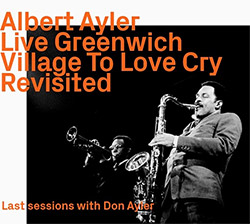


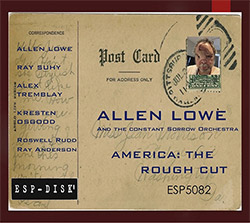
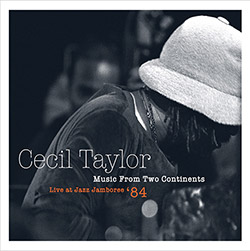

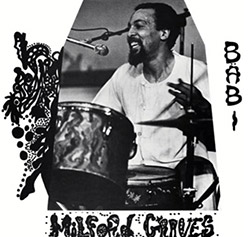

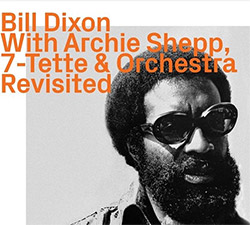
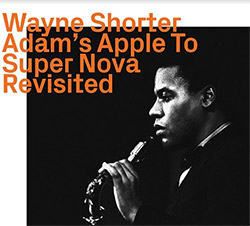
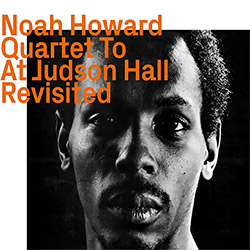

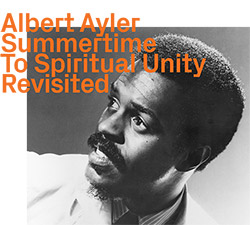
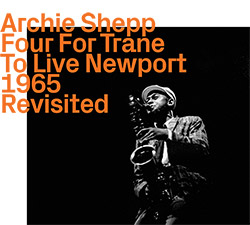
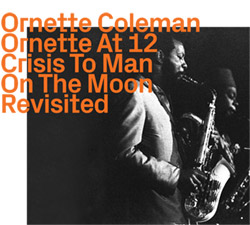

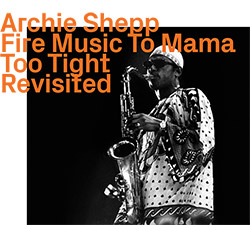


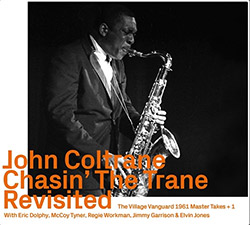
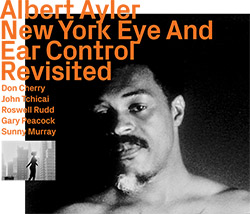





![BlueRing Improvisers: Materia [2 CDs]](https://www.teuthida.com/productImages/misc4/36513.jpg)








![Wheelhouse (Rempis / Adasiewicz / McBride): House And Home [VINYL]](https://www.teuthida.com/productImages/misc4/36462.jpg)
![+DOG+: The Light Of Our Lives [2 CDs]](https://www.teuthida.com/productImages/misc4/36009.jpg)


![Parker, Evan / Jean-Marc Foussat: Insolence [VINYL]](https://www.teuthida.com/productImages/misc4/36398.jpg)










![Deupree, Jerome / Sylvie Courvoisier / Lester St. Louis / Joe Morris: Canyon [2 CDs]](https://www.teuthida.com/productImages/misc4/36404.jpg)



![Eventless Plot | Haarvol: The Subliminal Paths [CASSETTE + DOWNLOAD]](https://www.teuthida.com/productImages/misc4/36232.jpg)










![Eventless Plot | Francesco Covarino: Methexis [CASSETTE + DOWNLOAD]](https://www.teuthida.com/productImages/misc4/36231.jpg)



![Das B (Mazen Kerbaj / Mike Majkowski / Magda Mayas / Tony Buck): Love [VINYL]](https://www.teuthida.com/productImages/misc4/36329.jpg)


![Eternities: Rides Again [CASSETTE]](https://www.teuthida.com/productImages/misc4/36247.jpg)
![Lopez, Francisco: Untitled (2021-2022) [2 CDs]](https://www.teuthida.com/productImages/misc4/36438.jpg)






![Money : Money 2 [2 CDs]](https://www.teuthida.com/productImages/misc4/35894.jpg)




![Klinga, Erik: Elusive Shimmer [VINYL]](https://www.teuthida.com/productImages/misc4/36258.jpg)
![CHANGES TO blind (Phil Zampino): Volume 9 - I Wave on a Fine Vile Mist [CD + DOWNLOAD]](https://www.teuthida.com/productImages/misc4/36061.jpg)

![Wallmart / Rubbish: Asset Protection [split CD]](https://www.teuthida.com/productImages/misc4/35900.jpg)


![+Dog+: The Family Music Book Vol. 5 [2 CDs]](https://www.teuthida.com/productImages/misc4/35897.jpg)
![Kuvveti, Deli : Kuslar Soyledi [CASSETTE w/ DOWNLOAD]](https://www.teuthida.com/productImages/misc4/36107.jpg)

![Brown, Dan / Dan Reynolds: Live At The Grange Hall [unauthorized][CASSETTE]](https://www.teuthida.com/productImages/misc4/36245.jpg)








![Palestine, Charlemagne / Seppe Gebruers: Beyondddddd The Notessssss [VINYL]](https://www.teuthida.com/productImages/misc4/36206.jpg)
![Palestine, Charlemagne / Seppe Gebruers: Beyondddddd The Notessssss [NEON GREEN VINYL]](https://www.teuthida.com/productImages/misc4/36207.jpg)

![Laubrock, Ingrid: Purposing The Air [2 CDs]](https://www.teuthida.com/productImages/misc4/35639.jpg)

![Yoko, Ono / The Great Learning Orchestra: Selected Recordings From Grapefruit [2 CDs]](https://www.teuthida.com/productImages/misc4/35841.jpg)









![Zorn, John / JACK Quartet: The Complete String Quartets [2 CDs]](https://www.teuthida.com/productImages/misc4/35609.jpg)

![Lonsdale, Eden: Dawnings [2 CDs]](https://www.teuthida.com/productImages/misc4/35480.jpg)



![Sorry For Laughing (G. Whitlow / M. Bates / Dave-Id / E. Ka-Spel): Rain Flowers [2 CDS]](https://www.teuthida.com/productImages/misc4/35985.jpg)

![Rolando, Tommaso / Andy Moor : Biscotti [CASSETTE w/ DOWNLOADS]](https://www.teuthida.com/productImages/misc4/36106.jpg)


![Electric Bird Noise / Derek Roddy: 8-10-22 [CD EP]](https://www.teuthida.com/productImages/misc4/35970.jpg)








![Elephant9 : Mythical River [VINYL]](https://www.teuthida.com/productImages/misc4/34624.jpg)



![Elephant9 with Terje Rypdal: Catching Fire [VINYL 2 LPs]](https://www.teuthida.com/productImages/misc4/35355.jpg)
![Deerlady (Obomsawin, Mali / Magdalena Abrego): Greatest Hits [VINYL]](https://www.teuthida.com/productImages/misc4/34876.jpg)







![Surplus 1980: Illusion of Consistency [CD]](https://www.teuthida.com/productImages/misc4/35069.jpg)
![Staiano, Moe: Away Towards the Light [VINYL + DOWNLOAD]](https://www.teuthida.com/productImages/misc4/35037.jpg)
![Coley, Byron: Dating Tips for Touring Bands [VINYL]](https://www.teuthida.com/productImages/misc4/17906.jpg)

![Lost Kisses: My Life is Sad & Funny [DVD]](https://www.teuthida.com/productImages/misc4/lostKissesDVD.jpg)